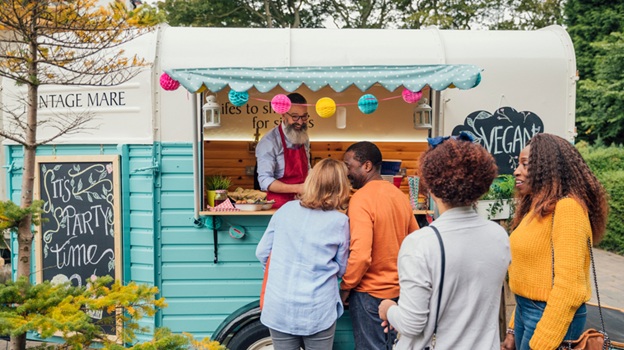Food trucks are more than just a convenient way to serve food — they’re a fun and memorable addition to any event. From weddings and birthday parties to corporate gatherings and community festivals, food trucks bring energy, personality, and great flavors. However, hosting an event with a food truck on-site takes a bit of planning to ensure everything runs smoothly. Here are some helpful tips to make your food truck event a success.
Choose the Right Location
The first thing to consider is where the food truck will park. Make sure your venue allows food trucks and that there’s enough space for the truck to park safely and for guests to line up comfortably. Ideally, the truck should be easy to access but not block main walkways or emergency exits. Consider factors like terrain (flat, paved surfaces work best) and proximity to other key areas of your event, such as seating or activity zones.
Plan for Enough Space
It’s not just the truck that needs space — you’ll want to provide room for guests to gather, place their orders, and enjoy their food. If your event includes tables or picnic blankets, arrange them nearby without crowding the truck. This helps avoid congestion and keeps the flow of the event relaxed. Think about adding signs or markers to guide people to the truck, especially at larger events.
Time the Service Right
Food trucks are great at serving delicious meals, but depending on the menu, some dishes take a little time to prepare. If you’re hosting an event with a tight schedule (like a wedding with a set program), work with the food truck vendor ahead of time to create a service plan. Consider options like a limited menu, pre-ordering, or staggered service times so guests aren’t waiting too long for their food.
Offer a Menu That Suits Your Guests
Food trucks often offer customizable menus, which makes it easy to cater to your specific crowd. Before the event, think about your guests’ tastes and dietary needs. Are there vegetarians, vegans, or people with food allergies attending? Sharing these details with your food truck vendor allows them to plan a menu that works for everyone. For a fun twist, you could book a vegan-friendly food truck such, as a waffle truck, and let guests choose from a variety of toppings, from sweet treats to savory delights.
Secure the Necessary Permits
Depending on where your event is taking place, you may need permits for the food truck. Many venues will handle this for you, but if you’re hosting in a public space, such as a park or street, it’s worth checking with your local city or county offices. Make sure all paperwork is in order well before your event date to avoid any last-minute issues.
Consider Waste and Cleanup
Food trucks usually provide disposable containers and utensils, but it’s important to plan for trash and recycling stations nearby. Place labeled bins in convenient spots so guests can easily clean up after themselves. You may also want to assign someone to check on these stations throughout the event to keep things tidy and pleasant.
Think About Weather and Comfort
Since food trucks typically serve outdoors, consider the weather forecast. If it’s a hot day, provide shaded seating or cooling stations for guests waiting in line. On cooler days, outdoor heaters or blankets can add comfort. A backup plan, like a tented area or indoor space, can also be helpful if unexpected rain or wind makes outdoor dining less appealing.
Add Entertainment or Activities
A food truck can be a star attraction, but pairing it with other activities keeps the energy up while guests wait for their meals. Lawn games, live music, or a photo booth can give people something to do and add to the festive atmosphere. This is especially helpful at larger events where food truck lines might get longer during peak meal times.
Communicate with Your Guests
Let guests know that a food truck will be on-site so they come prepared. If your event has a casual vibe, encourage guests to bring picnic blankets or folding chairs. If there are specific ordering times or menu options, share those details in advance so everyone knows what to expect.
Support Local and Seasonal Offerings
Many food trucks focus on locally sourced and seasonal ingredients. When you work with your vendor, ask about highlighting local specialties or in-season produce. Not only does this support small businesses in your community, but it also provides guests with a fresh and memorable dining experience.
Adding a food truck to your event is a fantastic way to create a casual, fun, and delicious atmosphere. With a little preparation, you can ensure the experience is smooth for both your guests and your vendor. From selecting the perfect spot to planning for comfort and cleanup, these tips will help you host an event where the food truck is a true highlight.




